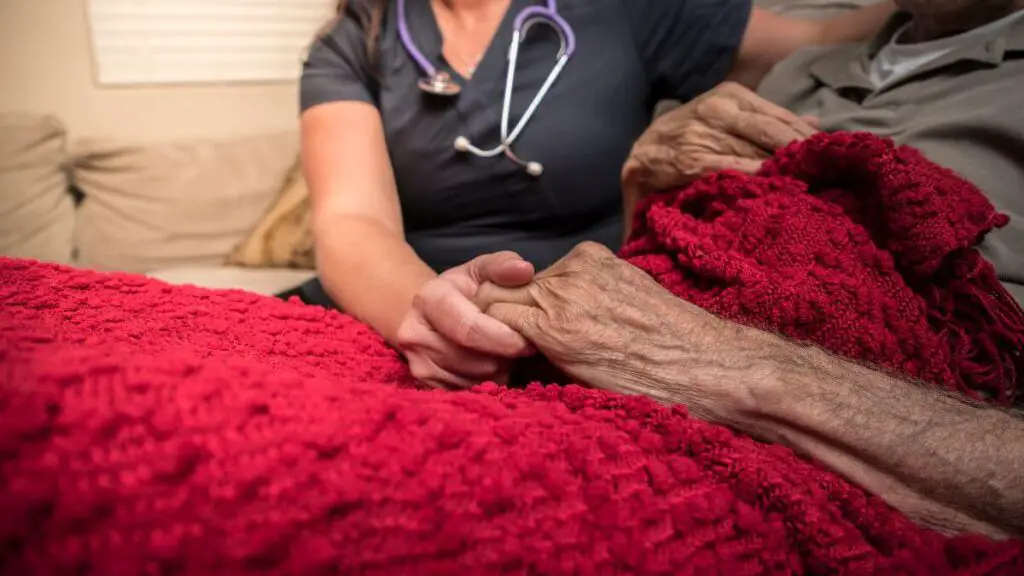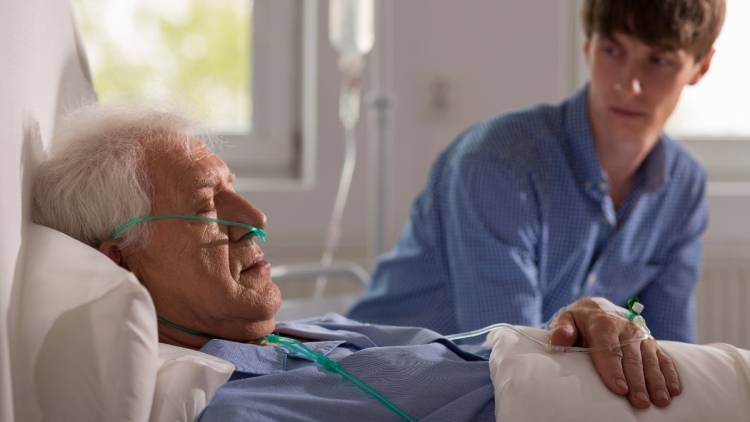I’ve watched people die with dementia. I’ve worked with their nurses, doctors, and family members. Even hospice can’t tell you exactly when someone will die. But there are certain signs death is near for dementia patients.
Watching a loved one die from dementia is very difficult. Dementia has become far too common and it is expected that the number of people who have dementia will double every 20 years. In the U.S., dementia is ranked as the sixth most common cause of death.
But that last point can be a bit misleading. People do not die from dementia, they die from the complications associated with dementia. When people talk about someone dying from dementia, they’re really talking about the person dying from something else brought on by the dementia.
Dementia can occur from several different causes:
- The most common cause is Alzheimer’s disease, when plaques of amyloid protein and tau tangles accumulate in the hippocampus of the brain. This interferes with memory and learning.
- The second most common cause is Lewy Body dementia which also has abnormal protein deposits in the brain, causing cognitive problems.
- The third is frontotemporal dementia, when the accumulation of the proteins is in the frontal and temporal lobes of the brain. Impaired blood circulation that is caused by other conditions such as traumatic brain injuries, alcohol or drug use, infections or fluid buildup in the brain.
How Dementia Patients Typically Die
There are different stages to dementia. In the early stage, patients lose track of time, get lost easily in familiar places, and are forgetful. In the middle stages, the recall of people’s names is a problem as is confusion even when at home. They will begin to repeat the same questions because they have forgotten the answer or have forgotten that they asked the question in the first place. Communication becomes increasingly difficult in this stage and personal care starts to become a serious challenge.
In the later stage, face recognition of relatives and friends is an issue and they are becoming unaware of time and place. Their personal care needs require more help and they have difficulty in walking. Aggression may suddenly come out of nowhere. And problems with incontinence and sleeping excessive hours is as well.
The majority of patients with early stage dementia – two-thirds – live at home with family members caring for them. However, one survey reported that more than half of them were diagnosed with dementia and more than half were suffering from advanced dementia. Generally speaking, those who are in the advanced stages will be found in nursing homes since the toll the disease takes on family members is too high in many cases.
In the advanced stage of dementia, death is usually due to cachexia (wasting away) or dehydration. It’s common for those with dementia to die from pneumonia (25%), cardiovascular disease (44%), and sudden, unexplained deaths. The types of infections dementia patients tend to suffer from are respiratory and urinary tract.
Dementia is a progressive brain disorder. It impacts the body in many many ways.
The last 12 months of their lives, many dementia patients will suffer from pain, restrictions in mobility, and sleeping disorders. They will also tend to be apathetic and have anxiety. One study showed in the last month before dying, patients had pain, fear, anxiety, agitation, and resisted care. The pain comes from arthritis, infections, or constipation.
The unfortunate reality is that dying with late stage dementia is very difficult and very sad.
How Long Dementia Lasts Before Death
Those with dementia will have their lifespan shortened. The duration of illness varies, but the median age from diagnosis to death is 4-5 years. Women tend to survive longer with the disease than men, 4.6 to 5.1 years compared to 4.1 to 4.3 years. The type of dementia also affects how long a person has left to live; those with vascular dementia or Lewy Body Dementia die sooner than those with Alzheimer’s.
Mostly, the patient spends the longest time periods in the moderate and advanced stages of the disease. Women live the longest time in the advanced stage compared to men. And those who are older than 70 years and have Alzheimer’s disease seem to spend an average of four years in advanced dementia.
Not everyone with dementia makes it to the advanced stage. Only one-fourth of them do and moderate stages of dementia will take half of the dementia victims.
10 Signs Death is Near for Dementia
Health professionals aren’t the greatest at determining how long a person with dementia has to live. In one study, staff expected only 1% of nursing home residents with dementia to die within 6 months. However, 71% of them died during the six months.
Of course, saying exactly when a person will die is nearly impossible, even for medical professionals. There are signs death is near, however.
The following signs death is near for dementia patients are not necessarily imminent signs, not like a death rattle or failing lung function. These are signs that death is getting closer, however. Perhaps much closer.
- Everyday functions such as eating, bathing, dressing and toileting are difficult if not impossible.
- Sitting up in bed is not possible without assistance.
- Difficulty walking without assistance.
- Inability to speak and express emotions via facial movements.
- Dehydration.
- Malnutrition occurs primarily because of difficulty swallowing, drinking liquids and eating.
- Continually battling urinary tract infections, pneumonia, blood clots, or bedsores.
- Agitation and restlessness that doesn’t seem to go away (it may be due to an infection or pain).
- Incoherent moaning.
- Changes in breathing.
What Happens in the Final Stage of Dementia
In dementia, death may be sudden and unexpected or it may be slow and painful, showing a continual decline. The death will be expected if it’s accompanied by other health conditions such as an infection or serious malnutrition.
Bodily injury can also hasten death. A dementia patient who falls and breaks a hip could have limited days ahead.
In the very end stages, you may see profound weakness, reduced awareness of what is happening, disorientation, agitation, difficulty concentrating, or even the appearance they are speaking with someone from another world. There’s a progressive loss of memory.
Breathing changes to periods where it’s normal but then they stop breathing for a few seconds. There may be a faster breathing rate and there may be gaps in between breaths.
Accompanying these breathing changes may be pale and clammy skin. This may be because the circulation slows down the closer you get to death.
The Death Rattle
When the breathing sounds like gurgling, this is the death rattle I mentioned. This occurs in the last hours or few days of life. The person dying is not usually aware of this or other breathing changes. Some healthcare professionals will try to suction the throat to ease the death rattle, others advice against it.
I watched my grandfather dying in a hospital bed. The death rattle was loud. He did not seem bothered by it, but it was difficult to tell. Then the nurse suctioned his throat and the pain and discomfort from it became evident in his bodily response. He was not suctioned again.
How to Give Care in the Final Stages of Dementia
If your loved one is in the last stages of dementia, your goal may be to allow them to live as well as they can (with a high quality of living) until death. This will involve the following:
- Keep them clean.
- Help them stay comfortable.
- Help manage the distress they feel.
- Take care of their environment. Make sure their surroundings are safe, that the lighting is nice. Perhaps there is music the person loved that can be played.
- Tend to spiritual matters. Having someone to call for the last hour is important to many people. This may be a priest or minister who helps people make the transition.
- Make sure legal matters are understood. Have people seen copies of any power of attorneys or living wills?
- Treat them with respect, compassion, and dignity.
- Address family matters. It becomes a source of family division if all family members are not informed of what is happening. Everyone deserves an opportunity to say goodbye however they choose.
Is Caregiving Too Much?
One of the biggest concerns for patients with dementia is for those who are doing the caregiving. Often, it’s family members, and although this is a kind act, it has been found to cut the lifespan of the caregiver because of the high amount of stress attached to the job.
In a study by Ohio State University in conjunction with the National Institute on Aging, lifespan was shortened by four to eight years when adult children cared for their parents. The researchers focused on telomeres at the ends of the chromosomes of the caregivers. As we get older, telomeres naturally shorten. The longer your telomeres are, the longer your lifespan can be, not including tragic disasters that cut one’s life short. The caregivers showed shorter telomeres, suggesting a decrease in lifespan by up to 8 years.
This is why family caregivers of those with dementia are often called the invisible second patients. Unfortunately, there’s a psychological toll with the position, physical ill health, and financial hardship as well. In the U.S., at least 60% of unpaid caregivers are wives, daughters, daughters-in-law, granddaughters, and other female relatives.
Although there are certainly rewards to caregiving, it is stressful. Motivation to care give usually includes a sense of love or reciprocity, spiritual fulfillment, a sense of duty, guilt, social pressures, or sometimes greed. Those who identify with the more positive components of the role will experience less burden, better health and relationships, and greater social support.
Patients with dementia often have complex health care needs and may need expert care. Comprehensive management of the patient with dementia includes building a partnership between health professionals and family caregivers, experts say.
Many decisions have to be made when an adult in the family has dementia. The more you know and understand dementia, the better your decisions will be when the time comes to make them.




